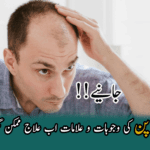Male baldness, medically known as androgenetic alopecia, is a common condition characterized by hair loss in men, often leading to partial or complete baldness. Understanding the causes, signs, and preventive measures for male pattern baldness is crucial for maintaining hair health and confidence.
Understanding Male Baldness
Causes of Male Pattern Baldness
Male baldness is primarily influenced by genetic factors and hormonal changes, particularly the presence of dihydrotestosterone (DHT), a derivative of testosterone. DHT shrinks hair follicles, leading to thinner and shorter hair growth cycles.
Recognizing the Signs of Balding
Common Signs and Symptoms
The early signs of male pattern baldness include a receding hairline, thinning hair on the crown or temples, and noticeable hair shedding. As the condition progresses, hair loss may become more pronounced, eventually leading to bald spots or complete baldness.
Preventive Measures for Hair Health
Lifestyle Changes for Preventing Hair Loss
Maintaining a healthy lifestyle can help prevent or slow down the progression of male baldness. Avoiding smoking, managing stress levels, and getting regular exercise can contribute to overall hair health.
Diet and Nutrition Tips for Promoting Hair Growth
A balanced diet rich in essential nutrients like vitamins A, C, D, and E, as well as iron, zinc, and protein, is vital for promoting hair growth and preventing hair loss.
Scalp Care and Hygiene
Proper scalp hygiene, including regular washing with a gentle shampoo and avoiding harsh chemicals or excessive heat styling, can help maintain a healthy scalp environment conducive to hair growth.
Medical Treatments for Male Baldness
Topical Treatments and Medications
Topical treatments containing minoxidil or finasteride are commonly used to stimulate hair growth and prevent further hair loss in men with androgenetic alopecia.
Surgical Options for Hair Restoration
For individuals seeking more permanent solutions, surgical procedures like hair transplantation or scalp reduction surgery may be recommended to restore hair density and improve aesthetic appearance.
Natural Remedies and Therapies
Herbal Remedies for Hair Loss
Certain herbal supplements, such as saw palmetto, pumpkin seed oil, and ginseng, are believed to have anti-androgenic properties that can help inhibit DHT production and promote hair growth.
Essential Oils and Their Benefits for Hair Health
Essential oils like rosemary, peppermint, and lavender are popular natural remedies for improving scalp circulation, strengthening hair follicles, and nourishing the hair shaft.
Hair Health: Male Baldness and Diet
Impact of Diet on Hair Health
A diet rich in fruits, vegetables, lean proteins, and healthy fats provides the essential nutrients needed for optimal hair growth and maintenance.
Nutrients Essential for Promoting Hair Growth
Key nutrients for healthy hair include biotin, vitamin D, omega-3 fatty acids, and antioxidants like vitamin E and selenium, which support hair follicle function and reduce oxidative stress.
Hair Care Products and Practices
Choosing the Right Shampoo and Conditioner
Using mild, sulfate-free shampoos and conditioners tailored to your hair type can help cleanse the scalp effectively without stripping away natural oils or causing irritation.
Styling Tips to Minimize Hair Damage
Avoiding tight hairstyles, excessive heat styling, and chemical treatments can help prevent hair breakage and minimize damage to the hair shaft, promoting overall hair health.
Emotional Impact of Male Baldness
Psychological Effects of Hair Loss
Hair loss can have a significant impact on self-esteem and body image, leading to feelings of embarrassment, social withdrawal, and depression in some individuals.
Coping Strategies for Dealing with Balding
Seeking support from loved ones, joining support groups or online communities, and exploring counseling or therapy can help individuals cope with the emotional challenges of male pattern baldness.
Support Systems and Communities
Importance of Support from Family and Friends
Understanding and empathetic support from family members, friends, and partners can provide comfort and encouragement to individuals struggling with hair loss.
Online Resources for Individuals with Hair Loss
Online communities, forums, and educational websites offer valuable information, advice, and support networks for individuals navigating the challenges of male baldness.
FAQs (Frequently Asked Questions)
- What are the primary causes of male pattern baldness?
- Can male baldness be prevented or reversed?
- Are there any natural remedies for promoting hair growth?
- How effective are medical treatments like minoxidil and finasteride?
- What lifestyle changes can help prevent hair loss?
- Is hair transplantation a permanent solution for male baldness?
Conclusion
In conclusion, maintaining optimal hair health and preventing male pattern baldness require a multifaceted approach, including lifestyle modifications, proper hair care practices, and, in some cases, medical interventions. By understanding the causes of hair loss, recognizing early signs of balding, and adopting preventive measures, individuals can promote hair growth and preserve their confidence and well-being.









